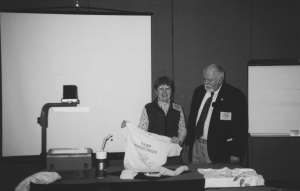Estate planning cannot accomplish as much for the future of your Tree Farm as a week of undivided attention with your grandchildren out in your woods. We created Camp Horsecreek, a week-long summer camp experience for our grandchildren on our Tree Farm, because we wanted to convey our love of the farm. We hope they will someday want to own and manage the acreage.
Creating a summer camp was a challenge. For ideas, we searched our memories, Project Learning Tree, Boy and Girl Scout handbooks, called our local resource forester and even read the kids magazines in the dentist's office. We found nature books in sticker and coloring styles at a local state park bookstore that were perfect for plant and animal identification. Be sure you include activities you enjoy as much as the children. It is important for you and the kids to have fun together. We now have two years of experience with Tree Farm Summer Camp and we are happy to share some of what we have learned.
You will need a helper to shoulder some of the responsibility; you won't be able to be in two places at once.
Camping out is a big part of the fun and the memories. We have a small tent, sleeping bag, folding stool and mess kit for each child. The first year, the kids were afraid to sleep in their own tents but were enjoying it by year two.
We include a broad range of activities and try to vary them each year. Our forestry projects have included marking a Tree ID Trail and planting trees. Our community service projects were painting a sign for a nearby rural church and cleaning up one mile of riverbank. The kids always make and take home a nature-oriented gift for their parents. Games are very popular. We introduced them to some of the old traditional games such as tree-legged and sack races. They enjoy nature scavenger hunts also.
We have discovered several "don'ts." We found theme parks weren't the place to go - the kids were wild, whiny and demanding - and we couldn't see any educational value to the experience. We prohibit electronic games, which are distracting in many ways. We don't allow TV viewing or computer use during camp week. We want them to experience something different from everyday life.
Several weeks before camp, we send a letter asking what five foods they love, what five foods they dislike, if they take medicine daily, if they have food allergies, how tall they are, what grade they are in, and what size T-shirt they wear. We also give them the clothing list. And they are asked to bring medical cards and parental permissions for medical treatment.
During the year we plan for camp, we keep a file of ideas that we review six weeks prior to camp. The best time to plan for the next year's camp is the seven days following the end of camp, because everything is fresh. We write down all our observations and save them for the next year. It's important that each year is basically the same but has a different emphasis.
You and your Tree Farm probably have everything necessary to create a never-to-be-forgotten experience for your grandchildren.
We established (and met) the following goals for the children:

Connie and John Johnson describe their "Summer Camp for Grandkids" at the 2001 Tree Farm Stewardship Days held March 2-3 in Jefferson City.
This article is adapted with permission from Connie Hjelmeng-Johnson, from "Survival Camp: Grandparents pass on their love of the woods in hopes of keeping the Tree Farm in the family" which appeared in the May/June 2000 issue of Tree Farm. The Johnsons were named Missouri State Tree Farmers of the Year in 1991 and 1998 and North Central Tree Farmers of the Year in 1992.